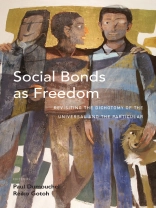Central to discussions of multiculturalism and minority rights in modern liberal societies is the idea that the particular demands of minority groups contradict the requirements of equality, anonymity, and universality for citizenship and belonging. The contributors to this volume question the significance of this dichotomy between the universal and the particular, arguing that it reflects how the modern state has instituted the basic rights and obligations of its members and that these institutions are undergoing fundamental transformations under the pressure of globalization. They show that the social bonds uniting groups constitute the means of our freedom, rather than obstacles to achieving the universal.
Tabella dei contenuti
List of Tables
Introduction: Of Bonds and Boundaries
Paul Dumouchel & Reiko Gotoh
Part I: Social bonds in transformation
Chapter 1. Incompleteness and the Possibility of Making: Towards denationalized citizenship?
Saskia Sassen
Chapter 2. Justice and Culture: New contradictions in the era of techno-nihilistic capitalism
Mauro Magatti
Chapter 3. Bounded Justifiability: Making commonality on the basis of binding engagements
Laurent Thévenot
Chapter 4. On the Poverty of our Freedom
Axel Honneth
Part II: Beyond imperial universalism
Chapter 5. Western Humanitarianism and the Representation of Distant Suffering: A genealogy of moral grammars and visual regimes
Fuyuki Kurasawa
Chapter 6. Parochial Altruism and Christian Universalism: On the deep difficulties of creating solidarity without outside enemies
Wolfgang Palaver
Chapter 7. Partial Commitments and Universal Obligations
Paul Dumouchel
Chapter 8. A Reluctant Cosmopolitan
Anne Phillips
Part III: Towards a re-conceptualization of liberalism
Chapter 9. Liberal Autonomy and Minority Accommodation: A new approach
Geoffrey Brahm Levey
Chapter 10. Cultural Boundaries and the Reasonable Accommodation of Minorities: Is secularism enough?
Gurpreet Mahajan
Chapter 11. Arrow, Rawls and Sen: The Transformation of Political Economy and the Idea of Liberalism
Reiko Gotoh
Conclusion: Social bonds as freedom
Notes on Contributors
Index
Circa l’autore
Paul Dumouchel is Professor of philosophy at the Graduate School of Core Ethics and Frontier Sciences, Ritsumeikan University, Kyoto. He is the author of Le sacrifice inutile essai sur la violence politique (Paris: Flammarion, 2011) and The Ambivalence of Scarcity and Other Essays (Michigan State University Press, 2014) and co-edited with Rieko Gotoh Against Injustice the New Economics of Amartya Sen (Cambridge University Press, 2009).












